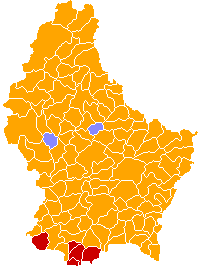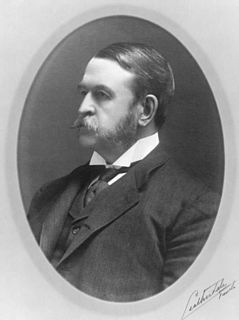 |
|---|
The Progressive Democratic Party of the North was a political party in Luxembourg.
 |
|---|
The Progressive Democratic Party of the North was a political party in Luxembourg.
The party was established by liberals in the north of Luxembourg and was linked to the Radical Socialist Party. [1] It was led by former National Independent Party MP Nicholas Mathieu. [1]
In the 1931 elections it received 5.3% of the vote, winning a single seat. It did not contest the partial elections of 1934, as its seat was not up for election. By the 1937 elections Mathieu was head of a new party, the Liberal Party. [1]
The politics of Luxembourg takes place in a framework of a parliamentary representative democratic monarchy, whereby the Prime Minister of Luxembourg is the head of government, and the multi-party system. Executive power is under the constitution of 1868, as amended, exercised by the government, by the Grand Duke and the Council of Government (cabinet), which consists of a prime minister and several other ministers. Usually, the prime minister is the leader of the political party or coalition of parties having the most seats in parliament. Legislative power is vested in both the government and parliament. The judiciary is independent of the executive and the legislature.

The Christian Social People's Party, abbreviated to CSV or PCS, is the largest political party in Luxembourg. The party follows a Christian-democratic and conservative ideology and, like most parties in Luxembourg, is strongly pro-European. The CSV is a member of the European People's Party (EPP) and the Centrist Democrat International (CDI).

The Democratic Party, abbreviated to DP, is the major liberal political party in Luxembourg. One of the three major parties, the DP sits on the centre-right, with some centrist factions. holding moderate market liberal views combined with a strong emphasis on civil liberties, human rights, and internationalism. The Democratic Party's traditional ideological spectrum was evaluated as conservative-liberal, but now it is often evaluated as social-liberal.

The Liberal Party is a liberal political party in the United Kingdom that was founded in 1989 as a continuation of the original Liberal Party by former members who opposed its merger with the Social Democratic Party (SDP) to form the Liberal Democrats. The party holds twelve local council seats.

General elections were held in Luxembourg on 13 June 2004, alongside European Parliament elections. The ruling Christian Social People's Party (CSV) of Prime Minister Jean-Claude Juncker won the election, increasing its number of seats to its highest since before 1989 and its share of the vote to levels not seen since the 1959 election.

The Greens is a green political party in Luxembourg.

The 1914 Ontario general election was the 14th general election held in the Province of Ontario, Canada. It was held on June 29, 1914, to elect the 111 Members of the 14th Legislative Assembly of Ontario (MLAs).

Jean Louis Joseph Lebeau was a Belgian liberal statesman, the prime minister of Belgium on two occasions.

In German politics, a traffic light coalition is a coalition government of the Social Democratic Party of Germany (SPD), the Free Democratic Party (FDP) and Alliance 90/The Greens. It is named after the parties' traditional colours, respectively red, yellow, and green, matching the colour sequence of a traffic light (Ampel). The term is also used for similar coalitions between social democrats, liberals and greens in other countries.
General elections were held in Luxembourg on 26 October 1919. They were the first held after several constitutional amendments were passed on 15 May of the same year. The reforms had introduced universal suffrage and proportional representation, increased the electorate from 6% of the population to 42%, and vested national sovereignty in the people, as opposed to the Grand Duke. They were also the first elections held after the German occupation during World War I.
General elections were held in Luxembourg on 21 October 1945. They were the first elections held after the German occupation during World War II. As a result of the war, the political alliances of the interwar period had been ended. In their place were new parties; the Christian Social People's Party, the Luxembourg Socialist Workers' Party, and the Patriotic and Democratic Group in place of the Party of the Right, Socialist Party, and Radical Liberal Party respectively. It is regarded as a realigning election, as the election established the party political order, with four established parties, that would be maintained until 1974.

The 1989 European Parliament election was a European election held across the 12 European Community member states in June 1989. It was the third European election but the first time that Spain and Portugal voted at the same time as the other members. Overall turnout dropped to 59%.
The Radical Liberal Party, abbreviated to PRL, was a Luxembourgian political party that existed from 1932 until 1945. It was the main party bridging the gap between the former Liberal League and the current Democratic Party.
Mathieu Ravignat is a Canadian federal politician from Cantley, Quebec, Canada, who was elected to the House of Commons of Canada from the riding of Pontiac in the May 2, 2011 federal election. He is a member of the New Democratic Party, which formed the official opposition in the 41st Canadian Parliament. He was defeated by Liberal Will Amos in the 2015 Canadian federal election.

Partial legislative elections were held in Belgium on 5 and 12 July 1896. Under the alternating system, elections were held in only five out of the nine provinces: Antwerp, Brabant, Luxembourg, Namur and West Flanders. Only 77 seats out of the 152 seats in the Chamber of Representatives were up for election. The Catholic Party retained their absolute majority.

Legislative elections were held in Belgium in June and July 1884, for partial Chamber and full Senate elections respectively. Voter turnout was 79.1% in the Chamber of Representatives elections, although only 69,276 people were eligible to vote.

The 2014 Quebec general election was held on April 7, 2014 to elect members to the National Assembly of Quebec. The incumbent Parti Québécois which had won a minority government in 2012 was defeated by the Quebec Liberal Party under Philippe Couillard who won a majority government of 70 seats, while the incumbent Parti Québécois finished second with 30 seats, becoming the first single-term government since Jean-Jacques Bertrand's Union Nationale government was defeated in 1970. Pauline Marois electoral defeat marked the shortest stay of any Quebec provincial government since the Canadian Confederation. It marked the lowest seat total for the Parti Québécois since 1989 and its smallest share of the popular vote since its inaugural run in 1970, as Premier Pauline Marois lost her own riding. The Coalition Avenir Québec under François Legault made minor gains in terms of seats despite receiving a smaller share of the popular vote than in the previous election. Québec solidaire won an additional seat, though co-spokesperson Andrés Fontecilla failed to win his riding. This election saw the return of the Liberals to power 2 years after their defeat in 2012. To date this is the last election where the Liberal Party won a majority of seats in the Quebec Assembly.

Early general elections were held in Luxembourg on 20 October 2013. The elections were called after Prime Minister Jean-Claude Juncker, at the time the longest-serving head of government in the European Union, announced his resignation over a spy scandal involving the Service de Renseignement de l'État (SREL). The review found Juncker deficient in his control over the service.
The Left Liberals were a political party in Luxembourg.
The Liberal Party was a political party in Luxembourg in the 1930s and 1940s.